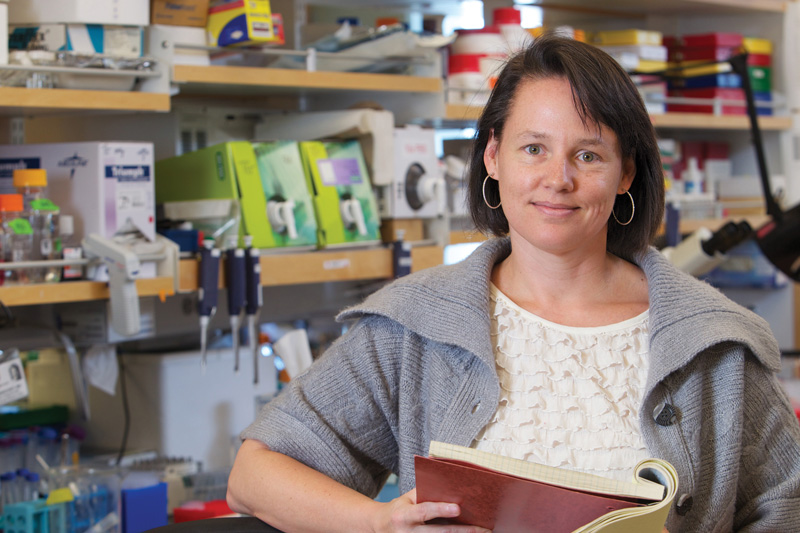
Tracy Grikscheit helps babies with digestive disorders. Stem cells could help her develop life-changing treatments.
It’s an instinct many surgeons have: Whatever you have to remove, replace it with something better. Something that helps. Tracy Grikscheit hopes to get there one day with the tiny patients she serves.
Grikscheit is a principal investigator at USC Stem Cell in the Keck School of Medicine of USC and the Saban Research Institute of Children’s Hospital Los Angeles. Her specialty is operating on babies born with severe bowel problems. Some are missing crucial nerve tissue in their intestines or have no functioning nervous system in the gut at all. When those neurons are deficient or nonexistent, the muscles can’t move food along the tract. Nutrients don’t get absorbed and stool becomes immobilized. It’s a life-threatening condition for a baby, and Grikscheit has to act fast.
Sometimes there’s nothing that can be done. When she can operate, Grikscheit often can cut out the bad portion of intestine, but complications and infection could leave the child with health problems, including difficult bowel movements, for years to come.
“I’m taking tissues out of small children, and doing a surgery that is necessary,” she says. “But you realize that you’ve now altered their lives. And you think, ‘Why am I not giving them back functional tissue to replace what I just took out?’”
One day, Grikscheit hopes to be able to do just that — take out the defective intestinal tissue and swap it for healthy, living tissue she’s grown in the lab using stem cells. Grikscheit and her team are conducting research on this potential with funding from the California Institute for Regenerative Medicine (CIRM).
Prop 14 Would Help Ensure Continued Stem Cell Funding
CIRM was created through a 2004 statewide ballot measure called Proposition 71, which voters approved by 59%. The funding voters allocated — $3 billion in bonds — helped build the Eli and Edythe Broad CIRM Center for Regenerative Medicine and Stem Cell Research at USC. Overall, CIRM has awarded $146.5 million in grants to USC scientists. But the funding that created the state’s stem cell agency has nearly run out, and voters are being asked to approve Prop 14, which would add another $5.5 billion in bonds for stem cell research and education.
The money supports bold ideas that wouldn’t otherwise get funded. In 2001, President George W. Bush cut off federal funding for research that used stem cells derived from human embryos. “But that no longer has to occur,” Grikscheit says. The therapy she studies uses stem cells from a newborn. She’s also studying the therapeutic possibilities of stem cells from adults. In both cases, the cells have the ability to change into any type of cell that can be used to repair muscle tissue, eyes, bones, and organs.
“None of that was possible a decade ago,” she says. “I have a pipeline now. And a lot of that is thanks to CIRM.”
Stem Cell Therapy for Birth Defects Depends on Research Funding
Andy McMahon, chair of stem cell biology and regenerative medicine at the Keck School of Medicine and director of USC’s stem cell research center, says Grikscheit is “like all surgeons: She’s very direct. She doesn’t waste any time, because surgeons have no time to waste. But she’s also very positive and enthusiastic.”
How do you get inured to the heartbreak of losing tiny patients?
“You don’t,” Grikscheit says. “And the day you do, you probably should stop. You come to know the families more deeply. You come to see the enormous courage that these families have. And so, I think the older you get, the more you understand just how much that family is losing out by having a child who has profound health problems.”
If Prop 14 doesn’t pass, the resulting interruption of stem cell funding would create a “valley of death between identifying something scientifically that could help people and then actually delivering it to patients,” she says. Testing that delivery would come in the form of a clinical trial of the stem cell treatment. Grikscheit’s team is working toward that, and she calls data collected during the past six months “surprisingly wonderful.”
“I’ve been really delighted with how the data is coming out,” she says. “And it’s almost impossible for any scientist to be delighted by their data.”
In her lab, Grikscheit says, “we always remember to talk about future human therapies.” Similar to a Silicon Valley startup, her researchers can work on side projects of their choosing.
“If you’re going to be an investigative creative scientist, why would you want to come just do what I want to do?” she says. “You should have fun doing it. Everybody has the ability to work on something that fascinates them. As long as it’s in the service of ‘Let’s save babies.’”
